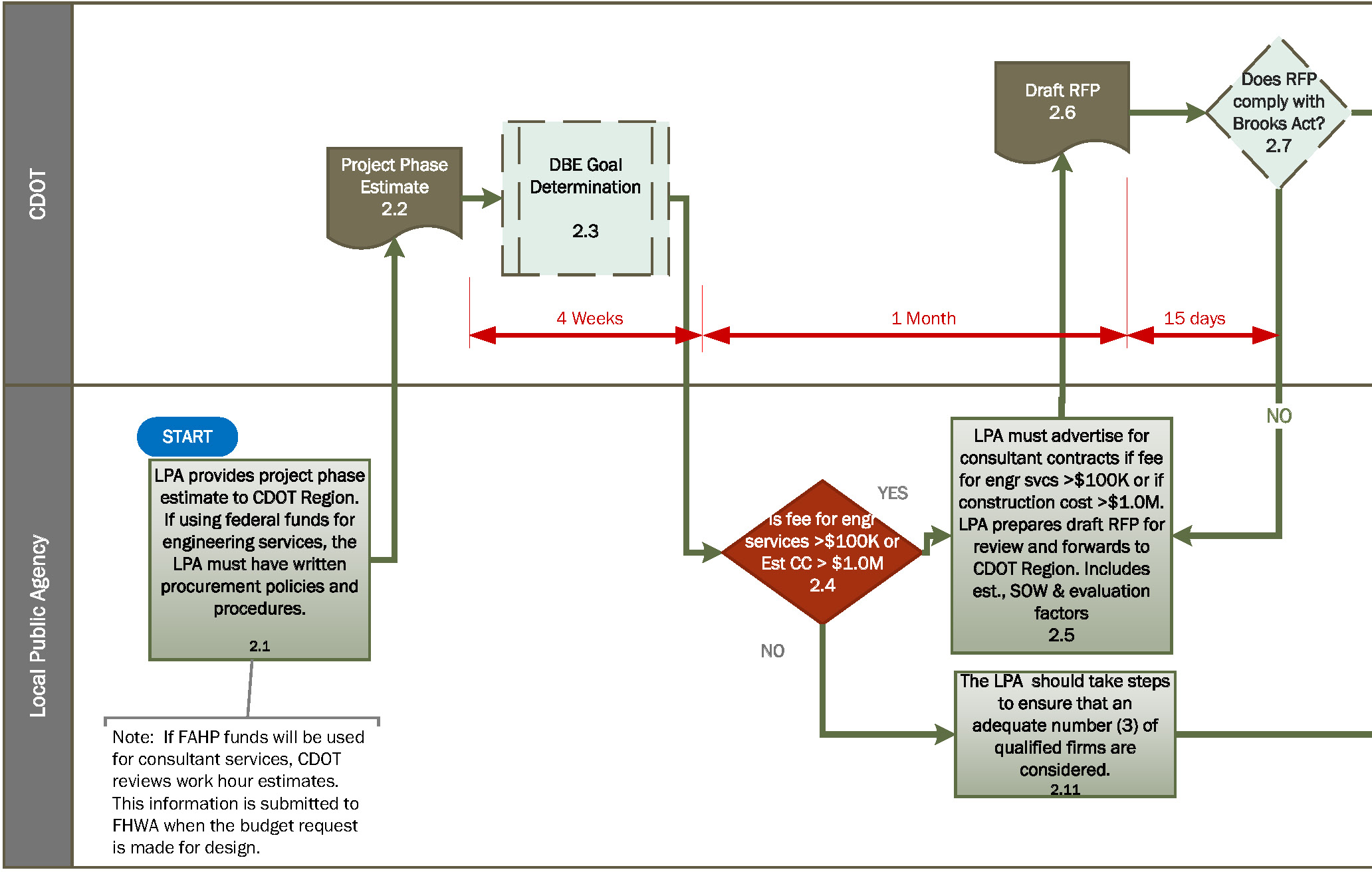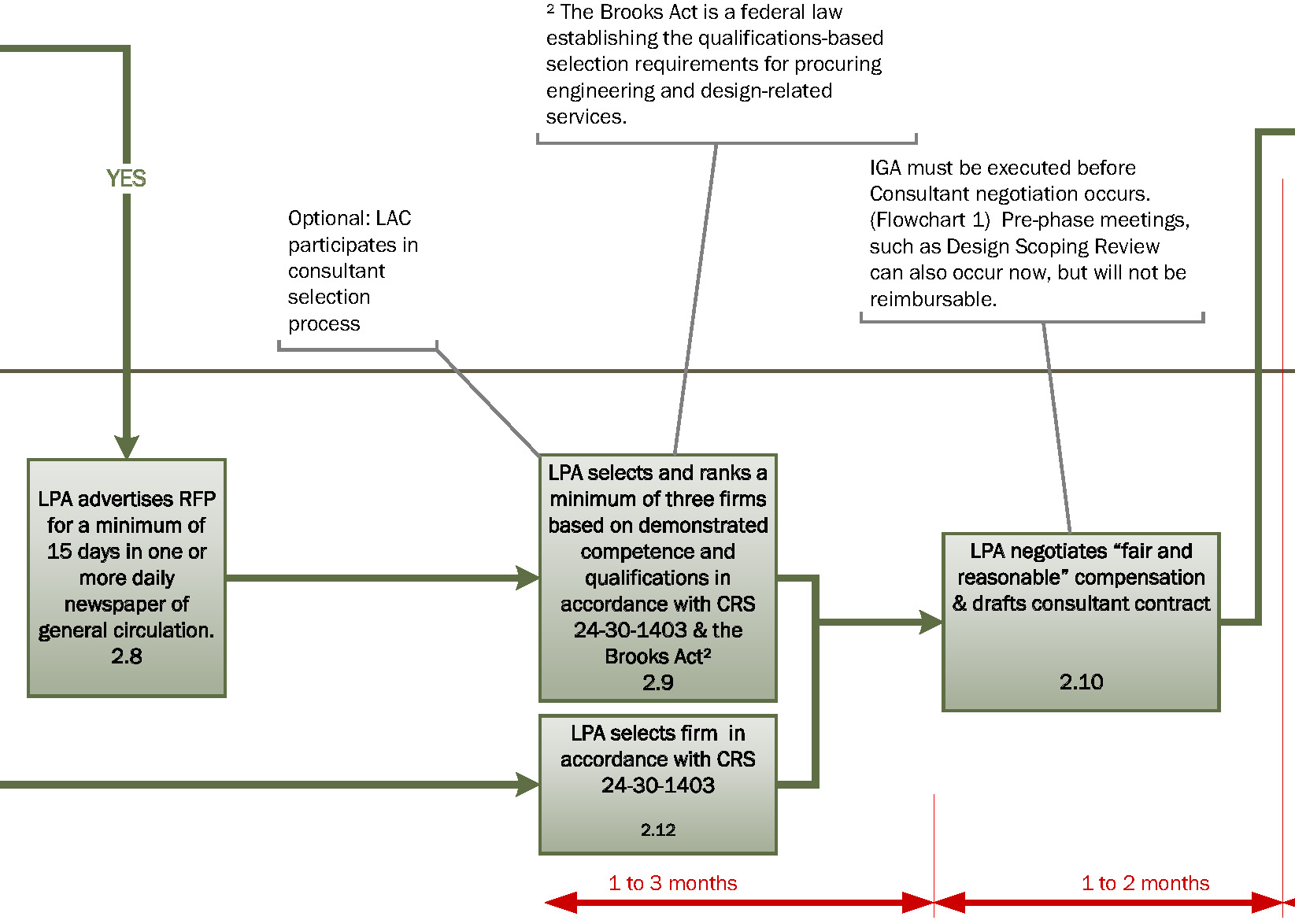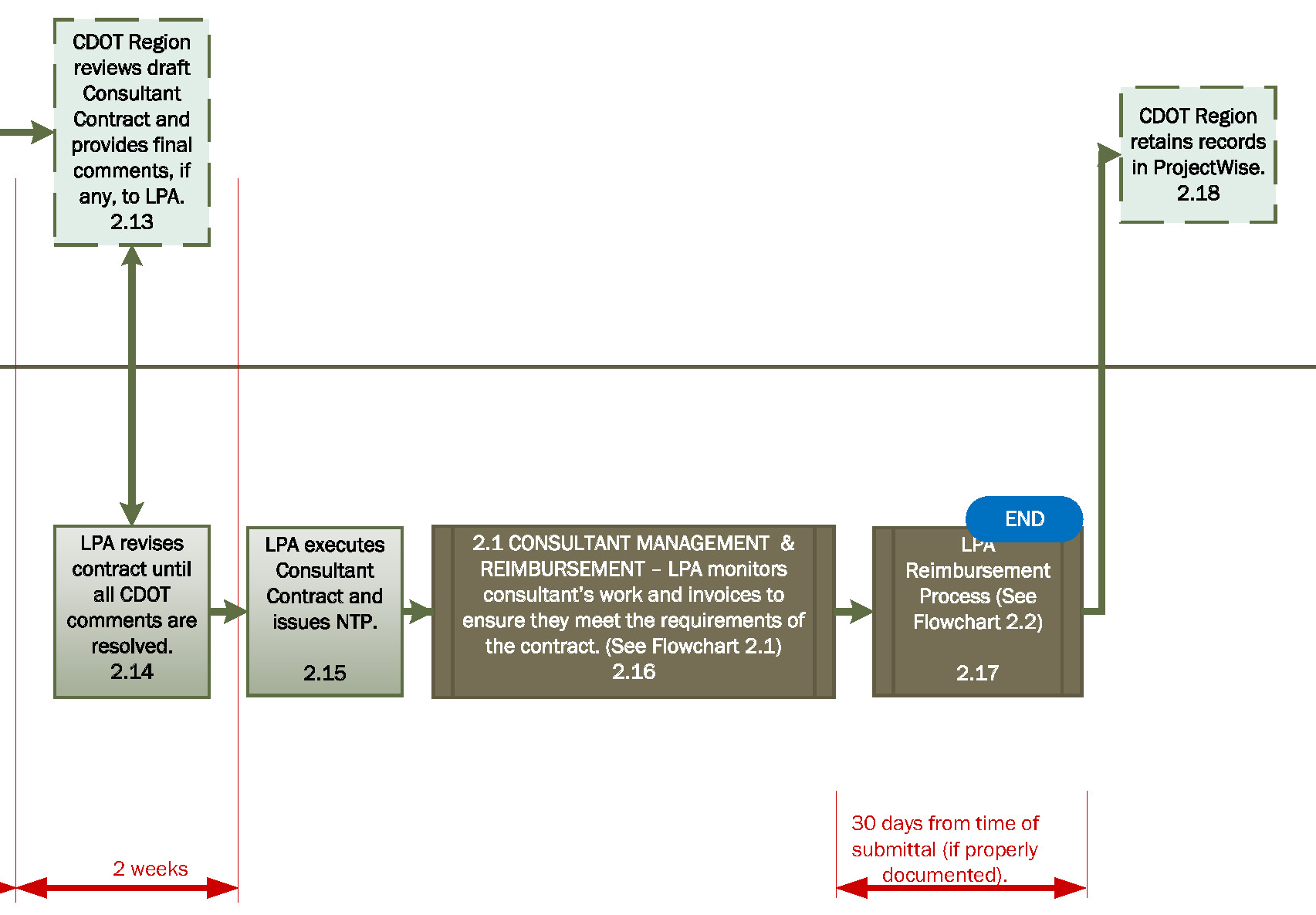Flowchart 2: LPA Procurement of Engineering Services Using FAHP Funds
You may hire a consultant to design and/or administer the construction of your project. Design and construction administration must be provided by different firms, unless you obtain a written waiver from CDOT. To obtain federal reimbursement for these services, you are required to use CDOT's consultant selection process or, with the prior approval of CDOT's Contracts & Market Analysis branch, use your agency's consultant selection process.
In order to obtain prior approval, your agency must have its attorney certify that the request for proposal (RFP) for consultant services you have prepared, and your agency's consultant selection process, are in conformance with federal and state laws. Your IGA's attachment H lists the procedures that your agency must use for agreements with professional consultant services, and lists the pertinent federal and state laws.
Your agency will prepare a written RFP to solicit proposals from the consultants. Please be aware that the same requirements apply to both requests for proposals (RFP) and requests for qualifications (RFQ). Title 23 CFR Part 172, Administration of Engineering and Design-Related Service Contracts requires CDOT to ensure that procurement actions by local agencies comply with this regulation and consultant contracts must be reviewed by CDOT prior to approval.
If Federal-aid Highway Program funds will be used for consultant services, you will also prepare work-hour estimates and submit to CDOT for review. A sample template for the work-hour estimates can be found in the templates section of this website, accessible from the home page.
If your agency does not want reimbursement for consulting services, you may use your agency's consultant-selection process without CDOT approval. For consultants performing right-of-way services, see Chapter 8 of the CDOT Right of Way Manual.
You can contact the Agreements unit of the Contracts and Market Analysis branch for a copy of CDOT's Selection Process for Professional Consultant Services Contracts.
For additional information, see FHWA videos on Consultant Services Overview and Organizational and Consultant Conflicts of Interest.
If Federal-aid Highway Program funds will be used for consultant services, CDOT will review the work-hour estimates prepared by your agency. CDOT will submit this information to FHWA when the budget request is made for design.
For any project containing federal funds, or for any project that will seek reimbursement with federal funds, a goal for disadvantaged business enterprise (DBE) participation must be established by CDOT, and you must make good faith efforts to meet such goal. Project goals vary depending on the nature of the work and the availability of DBE firms capable of performing such work. There are instances when the goal may be zero percent.
You must submit a scope of work, services to be provided and estimated cost of the total services to the CDOT project manager. The CDOT project manager will contact the CDOT regional Civil Rights Office to have the project evaluated for potential DBE participation and a DBE goal set for the project. For projects requiring advertisement, the request for proposal (RFP) must contain a goal in order to be advertised—even if the CDOT regional Civil Rights Office establishes a goal of zero percent. You must ensure that the selected consultant either meets the DBE goal or makes good faith efforts to do so.
You must advertise for consultant services if the basic construction cost of the project is expected to exceed $1 million, or if the fee for engineering or surveying services is expected to exceed $100,000.
If the cost is expected to be less than $100,000, advertisement is not necessary. In those instances, you should contact the CDOT project manager for direction.
As the contracting agency, you must document the need for obtaining professional services.
Prior to solicitation for consultant services, you must develop a detailed scope of work and a list of evaluation factors and their relative importance. The evaluation factors are those identified in Colorado Revised Statute 24-30-1403, Professional services—listings— preliminary selections. A detailed cost estimate must also be prepared for use during negotiations.
You must prepare a written request for proposal (RFP) or request for qualifications (RFQ) to solicit proposals from consultants. The request for proposals must include the scope of work, the evaluation factors and their relative importance, the method of payment, and the goal for disadvantaged business enterprise (DBE) participation set by CDOT. Refer to CDOT's DBE Definitions and Requirements for Consultant Contracts. These requirements outline all of the CDOT DBE forms that are required of prime consultants, and explain how they relate to evaluation factors and contract compliance.
Additional information is available on FHWA requirements for consultant services, and in FHWA videos on Supervising Agency Requirements (Responsible Charge) and Hiring a Consultant Using Competitive Negotiation Procedures.
Once the draft document has been finalized and reviewed by your agency, you must forward the RFP to your CDOT project manager for review.
The draft RFP shall be reviewed by the CDOT project manager prior to solicitation to ensure that it complies with the Brooks Act. The Brooks Act is a federal law establishing the qualifications-based selection requirements for procuring engineering and design-related services.
The advertisement period must be a minimum of 15 days prior to the selection of the three most qualified firms, and the advertising should be done in one or more daily newspapers of general circulation. Solicitation websites can also be used to advertise the project
You should evaluate and select consultants in accordance with Colorado Revised Statutes 24-30-1403. This section of the regulation identifies the criteria to be used in the evaluation of consultants and their team. It also shows which criteria are used to short-list and make a final selection.
The selection process is qualification-based; under Colorado Revised Statute 24-30-1401, Legislative Declaration, cost shall not be considered a factor in the evaluation of professional consultant services.
Selection is based on the following evaluation factors:
- Project team
- Firm capability
- Past performance on similar projects
- Work location
- Capacity
- Understanding of the project goals
- Project control
- Project concept
- Project critical issues
Optionally, you can short-list the top firms (minimum of three) and invite them to participate in a presentation and interview phase. Your final selection will then be made after the presentation and interview score is added.
Your CDOT project manager is available to participate in the consultant selection process.
After you select a consultant, you will enter into negotiations to obtain a fair and reasonable price for the anticipated work. The IGA between CDOT and your agency must be executed before consultant negotiation occurs.
Upon request, pre-negotiation audit evaluations are prepared by CDOT for contracts expected to be greater than $50,000. For audit assistance, contact your CDOT project manager.
Federal reimbursement is limited to those items allowable under the cost principles in Title 48 CFR 15, Contracting by Negotiation. Fees are determined with consideration given to such items as project size, complexity, duration, qualifications of contractors and degree of risk involved in the work. The fee is not to exceed 15 percent of the total allowable direct and indirect costs. Costs-plus-percent-of-cost contracts are not permissible.
After the consultant contract has been prepared, you should send it to the CDOT project manager for review. CDOT will review the contract for necessary federal requirements.
Small-purchase procedures (as specified in 23 CFR 172.7(a)(2)) involve contracts with total costs below the lesser of the federal simplified acquisition threshold (as specified in 48 CFR 2.101 and currently established at $150,000), or the state's established threshold (the state of Colorado's threshold is currently $100,000).
Small-purchase/simplified acquisition procedures for engineering and design-related services do not have to follow a competitive negotiation-/qualifications-based selection (Brooks Act) process, given the amount of contract award. However, you, as the contracting agency, should take steps to ensure that an adequate number of qualified firms are considered.
The FHWA considers three sources as the minimum number to meet the adequate number of sources requirement.
You must select a firm in accordance with CRS 24-30-1403. For small-purchase procurements, state and local public agencies must follow the state's laws, regulations and procedures, which are not in conflict with applicable federal laws and regulations (as specified in 23 CFR 172.7(a)(2) and 2 CFR 200.101, 2 CFR 200.317 and 2 CFR 200.318).
The draft consultant contract must be reviewed by the CDOT project manager to ensure the contract contains the necessary federal requirements.
If the consultant contract includes or is solely for construction contract administration services, the applicable CDOT construction and inspection manuals must be incorporated by reference in the contract between your agency and the consultant. For example, if the consultant is providing quality assurance inspections of fabricated items such as girders, the CDOT Bridge Fabrication Inspection Manual should be incorporated by reference in the consultant contract and the consultant required to follow the procedures outlined in the manual.
Work for consulting services will not be federally reimbursable until the consultant receives notice to proceed from you, subsequent to a signed IGA between your agency and CDOT.
A qualified employee of your agency must be responsible and in charge of the project to ensure that the work being done is complete, accurate, and consistent with terms, conditions, and specifications of the contract. At the end of the project, you will prepare a performance evaluation on the consultant (see CDOT Form 313 in the forms section on this website) and forward it to the CDOT project manager.
You are responsible to address and resolve any comments from CDOT.
Steps 2.1 through 2.15 in this flowchart must be documented in accordance with the provisions of Title 2 CFR 200, Uniform Administrative Requirements, Cost Principles, and Audit Requirements for Federal Awards, (subpart D, 200.333 Retention requirements for records), which provide for records to be kept at least three years from the date your agency submits its final expenditure report. Records of projects under litigation shall be kept at least three years after the case has been settled.
Colorado Revised Statutes 24-30-1401 through 24-30-1408, Title 23 CFR Part 172, and CDOT Procedural Directive 400.1 - Obtaining and Modifying Professional Services Contracts, provide additional details for complying with steps 2.1 through 2.15.
Appendix II to Part 200 (Title 2 CFR 200) – Contract Provisions for Non-Federal Entity Contracts Under Federal Awards also requires:
"It is also the responsibility of the Consultant to comply with the federal statutes and regulations cited in 2 CFR 200, Appendix II specifically (1) Administrative, contractual, or legal remedies, (2) Termination for cause and for convenience, (3) "Equal Employment Opportunity," (4) Copeland "Anti-Kickback" Act, (5) Davis-Bacon Act, (6) Contract Work Hours and Safety Standards Act, (7) regulations pertaining to reporting, (8) Patent rights, (9) Copyrights and rights in data, (10) Access by CDOT and FHWA to documents, (11) Retention of documents, (12) Clean Air Act, Clean Water Act, EPA regulations, and (13) energy efficiency conservation."
See 2 CFR 200 - Appendix II to Part 200.
Upon execution of the consultant contract, you will issue a letter of notice to proceed to the consultant and send a copy to the CDOT project manager.
You will monitor consultant work and invoices to ensure compliance with the terms of the IGA. See Flowchart 2A.
You will prepare requests for reimbursement and submit them to CDOT. See Flowchart 2B for more information.




